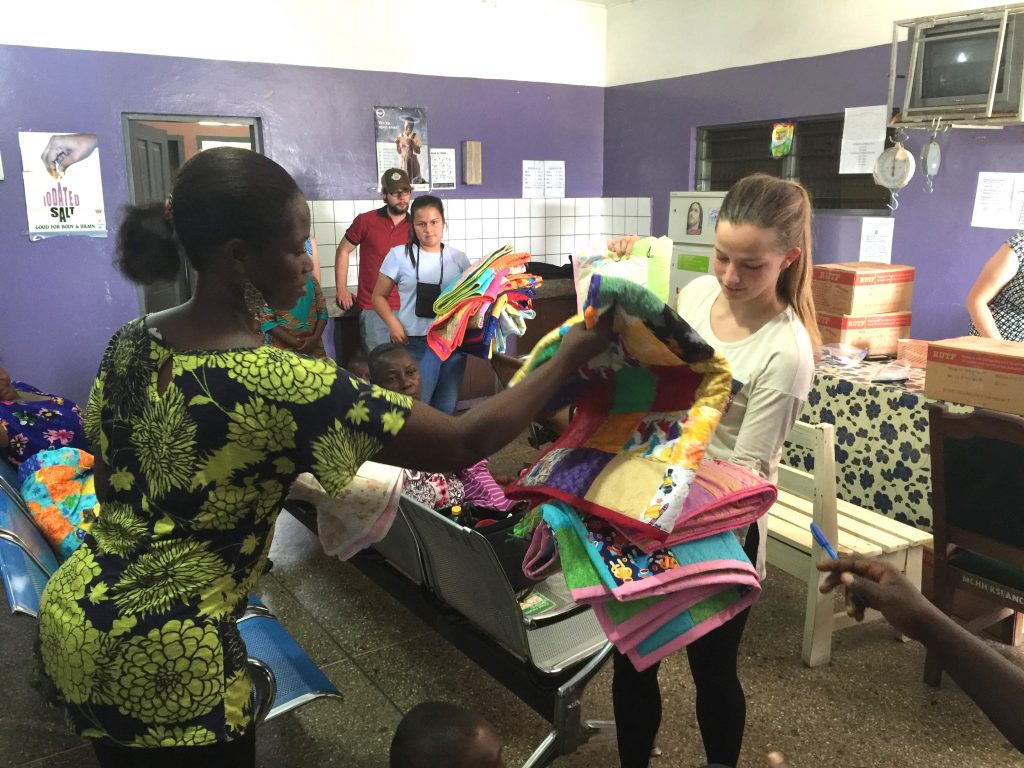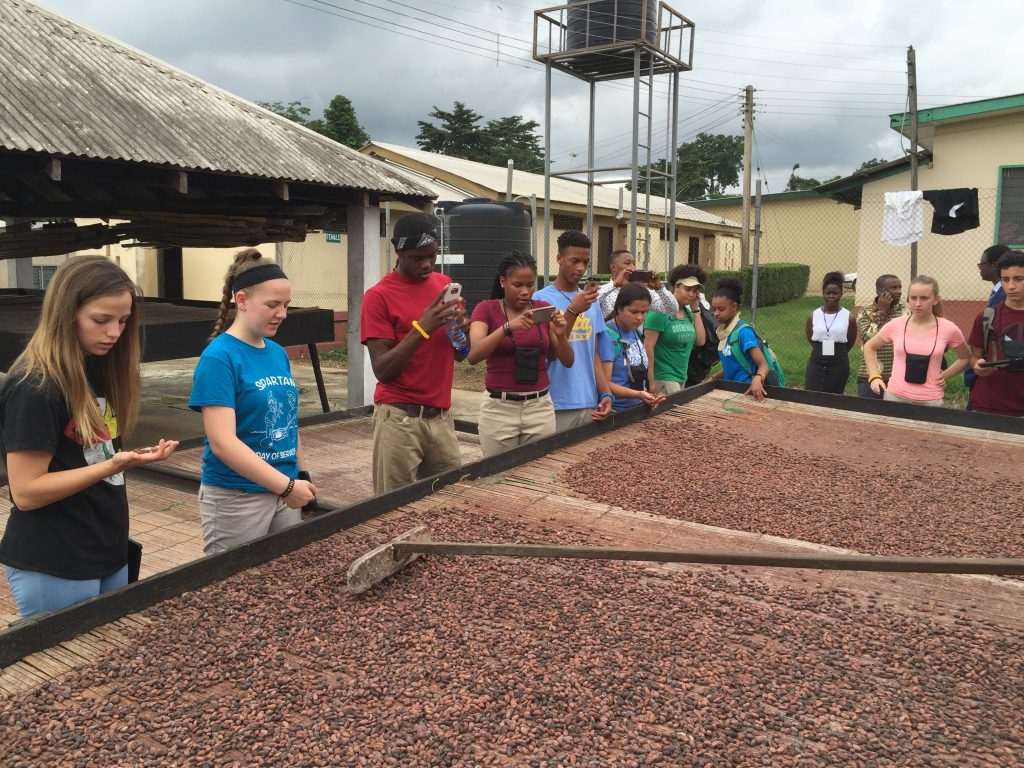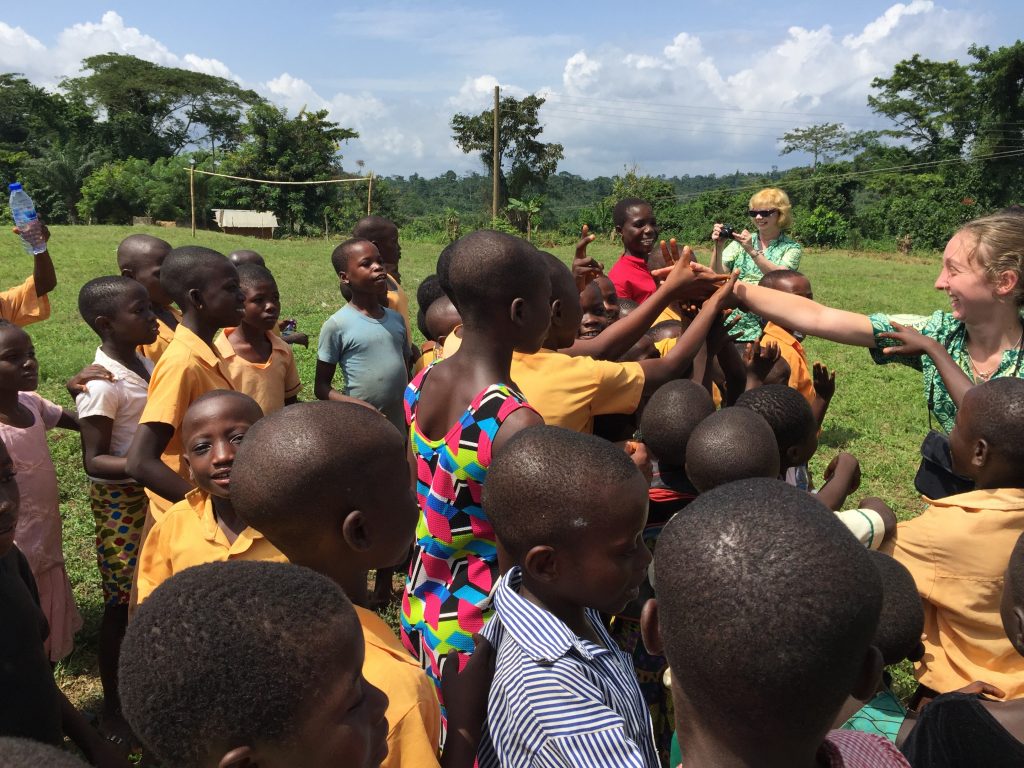Service Learning in Ghana: A Series of Reflections
Reflection One: Building Lifelong Connections
By Gabby, an MHS senior
I have been extremely blessed to travel to Ghana with Milton Hershey School’s Multicultural and Global Education program this past summer. It helped me come to the conclusion that all Americans should travel. I believe we need to see sharp contrast between our way of life and the lives of those who are not as lucky as we are.
Before traveling to Ghana, I thought I was poor. Now I know that so many people would be overjoyed to have what I do. In Ghana, the majority of people live in mud huts with thatch roofs. They rarely have running water, and many children are malnourished. But the people of Ghana are happy. They are proud of their country and always help one another. I’ve never met people in America who are as kind as those I met in Ghana.
It was challenging for us to see malnourished children without shoes on the streets. It was difficult for us to say “no” to vendors in the market, because we knew if they didn’t sell anything, they didn’t eat.
However, it was worth every uncomfortable feeling and awkward moment to be able to meet young farmers, and give blankets to children and mothers. As an MHS group, we will always be connected through sharing these once-in-a-lifetime experiences.
Traveling to another country changed my perspective. I learned I can make a difference in these people’s lives. I also learned I am much stronger than I ever thought. I learned how to talk to people from different backgrounds and how to truly understand another person’s culture. I hope to someday go back to Ghana and tell the people I met how much they changed my life.
For that, I will always be thankful to MHS and the people of Ghana.
Reflection Two: Understanding Social Barriers
By Jared, an MHS junior
“How was Ghana?” I, along with just about everyone else on the trip, have heard this question at least a dozen times. Of course it was amazing! But that’s just not enough to describe it. There are some experiences in life that simply cannot be articulated through words—they must be experienced.
My travels 5,000 miles across the Atlantic allowed me to view the world and humanity in a totally different way. After interacting with so many Ghanaian people, I’ve realized that all the social barriers our society puts in place are limiting and counterproductive. Concepts like nationalities, nations, and borders have essentially dissolved in my mind simply because of the outstanding sense of humanity displayed by the people of Ghana.
So many individuals who I befriended referred to me as “brother” or “son” in a way not commonly felt in America.
They truly meant it and seemed to recognize our common humanity rather than our nationality or colors. It is because of this that I now look at the world and its inhabitants as not nearly as separated as society makes us out to be.
Going to Ghana also gave me a new perspective on how God blesses our lives. I have come to realize that blessings are almost entirely subjective. For example, many Americans would consider themselves blessed to have been born in a country like America instead of a developing country like Ghana. But the reverse could be said of someone born in Ghana rather than America. I gained this new outlook after seeing how joyous and exuberant the average Ghanaian behaved compared to how the average American behaves. It became clear to me that a person can turn most situations into blessings—it’s all a matter of perspective.
Reflection Three: Visualizing Career Goals
By Emily, an MHS junior
In Ghana, there is a common saying that goes “Ghana is cocoa and cocoa is Ghana.” It is said with the utmost of pride and sincerity. Through the production and marketing of cocoa in Ghana, everything is used to its fullest potential. The money is used to build schools, hospitals, and roads. Almost everything we saw was impacted by cocoa, and you could see the importance it held when you saw the farmers’ families. They were happy providing for their communities and knowing they were part of making Ghana a better country. They laughed and joked, and nobody seemed depressed.
My favorite part of the trip was going to a school near the farms. They were the most beautiful kids I had ever seen—so cheerful and full of light. When I tried to take pictures, they screamed with joy and had large smiles when they saw themselves in the camera. I also taught them funny faces and dance moves. After a couple days, we went back and they still remembered me. They crowded around the bus making the same silly faces and I nearly cried. It was so heart-warming and eye-opening, and I will never forget them. We even had the opportunity to hand out candy, and the kids looked like they were going to burst with happiness and gratitude! I hope that when I go back in four years I have a chance to see them again.
Although there were many happy moments on the trip, there were humbling moments as well. On the first few days, we stayed in Ghana’s capital city, Accra. This was where we saw the contrast between rich and poor. We saw mud huts and children lining up at the well to get water for the day. There were goats, cats, dogs and chickens in the streets. When going through these villages on a bumpy dirt road, I saw a church without walls or a roof, not even a door. It was simply a framework with 20-30 chairs in the center. That struck me hard. It made me realize God doesn’t need a giant building for his worship and to work in the lives of His people. He can do it with anyone and anything, even an unfinished church.
Before going on the trip, I knew I wanted to be a veterinarian. After seeing all the animals and realizing how much the Ghanaians depended on them for their survival, I learned how important animals are to impoverished countries. It opened my eyes to the problems a lot of people face. Now I want to be an international veterinarian and travel to different countries to help their animals.
After seeing the struggles of millions, I don’t want to take for granted the opportunities I have in the U.S. More than anything, this trip has taught me that hope and love can exist in even the most desperate situations.
Hear more about Milton Hershey School’s trip to Ghana:





